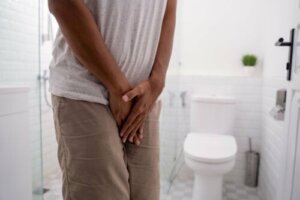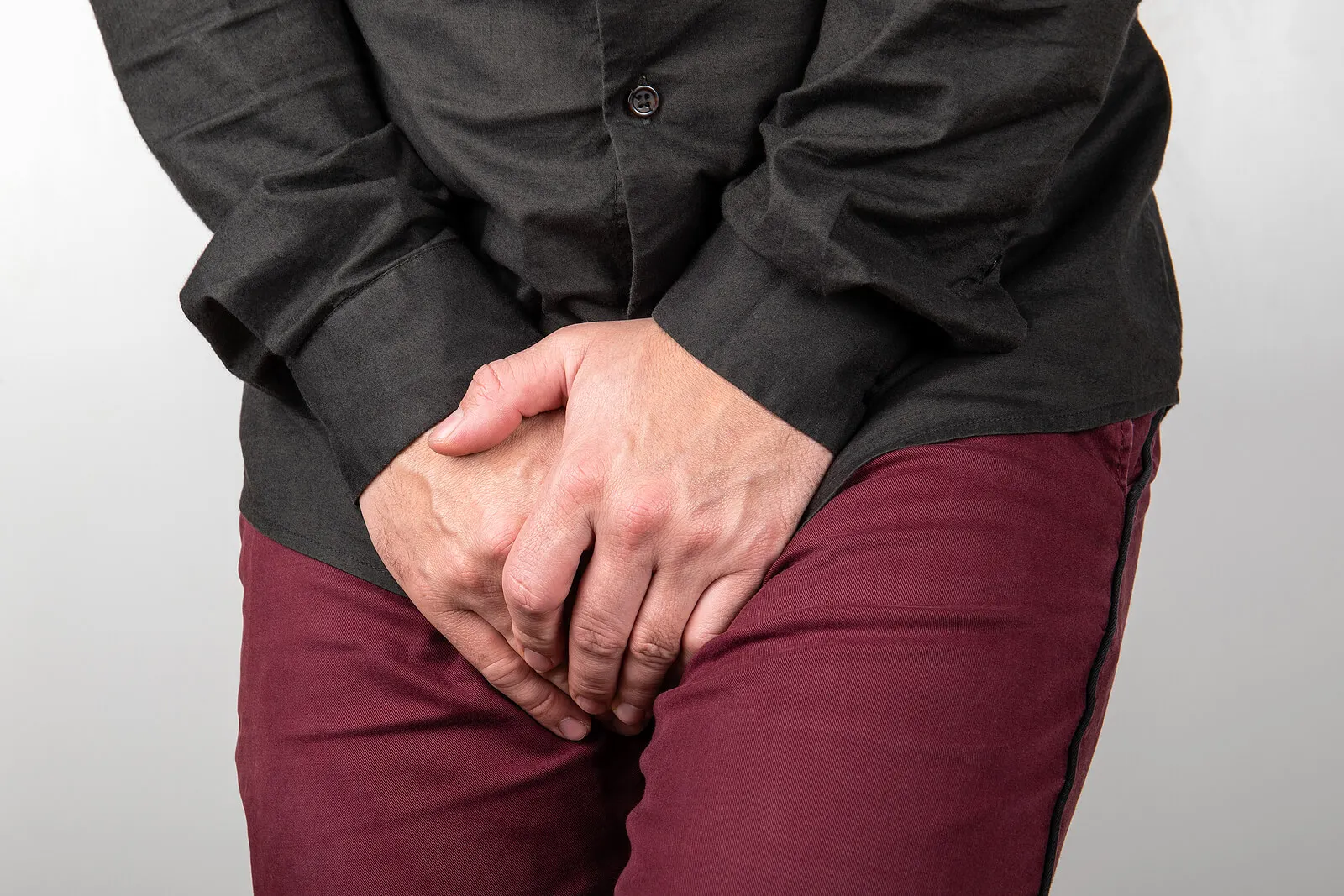Burning During Urination: Causes and Treatment


Reviewed and approved by the doctor Diego Pereira
Burning during urination, also known as dysuria, is a common condition suffered by millions of people. It is described as a burning or stinging sensation when urinating. Most cases occur when urine comes in contact with the mucosal lining of the urethral walls. We’ll show you its main causes and treatment.
When urine interacts with the inflamed or irritated mucosa there’s a contraction of the detrusor muscle and urethral peristalsis. As a consequence, submucosal receptors are stimulated causing pain, burning, or itching. Find out what can cause this process and the options available to counteract it.
Main causes of burning during urination
According to researchers, the causes of painful urination are divided into infectious and non-infectious. Hundreds of conditions are described that can directly or indirectly generate this symptom. Here are five of the most common triggers.
1. Cystitis
As Harvard Health Publishing reminds us, bladder infections, also known as cystitis, are the leading cause of burning during urination. Cystitis is more common in women than in men. This is because the urethra is shorter and straighter, making it easier for pathogens to ascend into the bladder.
Read also: All About the Symptoms of Cystitis in Men
Most bladder infections are mild, aren’t associated with complications, last only a couple of days, and are easy to treat. Researchers caution that persistent or difficult-to-treat infections are associated with an immunosuppressed system, renal failure, pregnancy, anatomic urinary tract abnormalities, overactive bladder, and pelvic muscle deficiency.
2. Urethritis

Infections of the urethra, also known as urethritis, are another cause of painful urination. Most of these infectious processes that trigger inflammation of the urethra are caused by viruses and bacteria. For the reasons explained in the previous section, it’s more common for women to develop this condition.
You may be interested in: Pain When Urinating: Causes and Symptoms
Having kidney stones, prostate inflammation, diabetes, pregnancy and being an older adult increases the chances of developing urethritis. Often those who develop this condition have increased frequency of urination, fever, and changes in urine patterns (odor, texture, and color).
3. Sexually transmitted infections
Sexually transmitted infections (STIs) can cause burning with urination. Chlamydia, gonorrhea, trichomoniasis, genital herpes, syphilis, and others may be behind these episodes.
Since all of these conditions may have no symptoms, you may just develop this symptom independently of other symptoms. As Johns Hopkins Medicine rightly reminds us, increased frequency of sexual intercourse, especially with different partners, increases the likelihood of contracting STDs, STIs, and other causes of burning with urination.
4. Medication intake
Any medication you take can cause you to develop adverse effects. Taking some of them can irritate or inflame the tissues lining the bladder or urethra. Therefore, the cause of your burning during urination may be due to starting treatment for a different condition.
If you suspect that this is the case, you could check the package insert or consult with your specialist about this side effect. In case you are self-medicating, seek competent medical attention about the viability of that medication to treat that condition.
5. Kidney stones
Kidney stones may also be behind these episodes. These are accumulations of calcium or uric acid that harden in or around the kidneys, and may move into the lower urinary tract and cause painful urination. They may be accompanied by the following symptoms:
- Lower back pain
- Changes in urine color (brown or pink)
- Fever and chills
- Urination with low volume, but very frequent
- Nausea and vomiting
Most stones are benign, and, although they may cause pain and burning, they don’t usually affect the urinary tract. When they’re larger, surgical removal and other procedures may be chosen to disintegrate them.
Other possible causes of burning urination that we cannot fail to mention are prostate infections, pyelonephritis, vaginitis, foreign body retention in the urethra, ovarian cysts, trauma, tumors, menopause, chemical sensitivity and bladder cancer (when postponed for several days and with moderate/intense symptoms).
Treatment for burning urination

Treatment of dysuria varies according to the underlying cause. Since infectious processes are the most common, and these are usually mild, pain during urination should disappear within a couple of days. Therefore, most people won’t require treatment.
When symptoms are very acute, you should seek medical assistance to find the trigger of the burning. The specialist may prescribe antibiotics when it’s a bacterial infection or use specific drugs for the condition that has been detected in the diagnosis. Remember that dysuria isn’t always related to a bladder or urethral infection, so you should avoid downplaying its importance.
As a complement, it’s advisable to implement a series of lifestyle changes to reduce the likelihood of similar episodes in the future. Here are some ideas:
- Avoid using scented soaps or soaps with strong chemicals that can cause irritation to the genitals
- Use barrier contraceptives when having sex
- Avoid douching
- Drink plenty of fluids during the day
- Clean the genitals after sexual intercourse – it’s also recommended to urinate immediately after intercourse.
- Reduce the consumption of alcohol and coffee, two agents that usually cause irritation
- Avoid wearing tight-fitting clothing and change underwear to reduce interaction with bacteria
In case you experience burning during urination several times a year, don’t hesitate to consult a specialist. Together you can find a trigger for the episodes, which will reduce them. In general, proper hygiene largely prevents the development of this condition.
All cited sources were thoroughly reviewed by our team to ensure their quality, reliability, currency, and validity. The bibliography of this article was considered reliable and of academic or scientific accuracy.
-
Dobrek, L. (2023). Lower Urinary Tract Disorders as Adverse Drug Reactions—A Literature Review. Pharmaceuticals, 16(7), 1031. https://www.mdpi.com/1424-8247/16/7/1031
-
Geerlings, S. E. (2016). Clinical presentations and epidemiology of urinary tract infections. Microbiology spectrum, 4(5), 4-5. https://journals.asm.org/doi/abs/10.1128/microbiolspec.uti-0002-2012
- Hanno, P. M., Erickson, D., Moldwin, R., & Faraday, M. M. (2015). Diagnosis and treatment of interstitial cystitis/bladder pain syndrome: AUA guideline amendment. The Journal of urology, 193(5), 1545-1553. https://www.auajournals.org/doi/full/10.1016/j.juro.2015.01.086
- James, R., & Hijaz, A. (2014). Lower urinary tract symptoms in women with diabetes mellitus: a current review. Current urology reports, 15, 1-8. https://link.springer.com/article/10.1007/s11934-014-0440-3
- Lazzeri, M., Sansalone, S., Guazzoni, G., & Barbagli, G. (2016). Incidence, causes, and complications of urethral stricture disease. European Urology Supplements, 15(1), 2-6. https://www.sciencedirect.com/science/article/abs/pii/S1569905615000652
- Lim, K. B. (2017). Epidemiology of clinical benign prostatic hyperplasia. Asian journal of urology, 4(3), 148-151. https://www.sciencedirect.com/science/article/pii/S2214388217300553
- Mehta, P., Leslie, S. W., & Reddivari, A. K. R. (2022). Dysuria. In StatPearls [Internet]. StatPearls Publishing.Consultado el 4 de marzo de 2024. https://www.ncbi.nlm.nih.gov/books/NBK549918/
- Menezes, C. B., Frasson, A. P., & Tasca, T. (2016). Trichomoniasis-are we giving the deserved attention to the most common non-viral sexually transmitted disease worldwide?. Microbial cell, 3(9), 404. https://www.ncbi.nlm.nih.gov/pmc/articles/PMC5354568/
- Phillips, N. A., & Bachmann, G. A. (2021). The genitourinary syndrome of menopause. Menopause, 28(5), 579-588. https://journals.lww.com/menopausejournal/Fulltext/2021/05000/The_genitourinary_syndrome_of_menopause.16.aspx
- Pineda-Murillo, J., Martínez-Carrillo, G., Marín-Acosta, D. D. J., Viveros-Contreras, C., Torres-Aguilar, J., & Pineda-Murillo, E. G. (2018). Tratamiento contemporáneo de la litiasis renal piélica: a propósito de un caso. Revista de la Facultad de Medicina (México), 61(4), 16-21. https://www.scielo.org.mx/scielo.php?pid=S0026-17422018000400016&script=sci_arttext
- Tan, C. W., & Chlebicki, M. P. (2016). Urinary tract infections in adults. Singapore medical journal, 57(9), 485. https://www.ncbi.nlm.nih.gov/pmc/articles/PMC5027397/
This text is provided for informational purposes only and does not replace consultation with a professional. If in doubt, consult your specialist.








